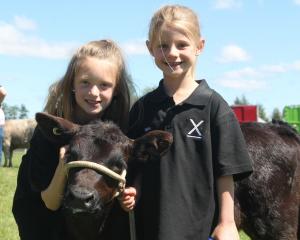
"It made the life a bit harder than it had to be."
For a bit of fitness, he went for a bike ride after finishing a day of lambing about 9pm in September last year.
"Without warning, my light shut off, I crashed and broke three vertebrae and a whole bunch of ribs."
He was off work for the second half of spring and wore a neck and back brace.
Stock manager Gary Phillips and farm worker Peter Stack increased their workload to keep the farm operating, Mr Irwin said.
"The boys had to step up and cover the gap."
The braces came off at Christmas but his recovery was continuing.
Just before the braces came off, the farm got 63% of lambs off their mother and sent away.
"We had a good draft."
The lamb progeny were the result of putting a Beltex terminal sire across his commercial Romney ewes.
Mr Irwin said he loved breeding sheep.
He was aged 6, when his late father Doug Irwin introduced South Suffolk sheep to Paramount.

Beltex genetics were introduced to the South Suffolk flock about four years ago.
Now about an eighth to a quarter of the genetics of the black flock was Beltex blood.
"To get the muscling in the backside and still keep the growth rates."
The first annual ram sale was held about 40 years ago.
Originally the sale was held at saleyards in the wider Gore area and moved on-farm five years ago.
Of the 43 rams on offer, 29 sold.
Demand for rams was down on past sales because of a fall in the sheep schedule.
"People are being a bit more careful with their spending."
His nephew Johnnie Wilson, of Clinton, paid the top price at the latest sale of $1400 for ram 877.
Mr Wilson said the appeal of the ram was its longevity, good back end and it having narrower shoulders than some other rams.
"I’m wanting compact sheep — big is not beautiful to me."
He bought 15 rams on the day.
"I’m really pleased with uncle Doug’s rams."

In the Paramount flock were 550 South Suffolk stud ewes, 450 performance-recorded Romney ewes and 300 commercial Romney ewes.
When asked if he did hogget lambing, Mr Irwin replied: "Not intentionally".
He and his father introduced deer to Paramount in the 1990s.
"I liked the fact there’s no dagging."
The herd of about 500 deer was mostly reds and a few Wapiti "to keep life interesting".
Paramount was originally called Boghead, due to its boggy condition more than a century ago.
Farm developments over the decades included improving the conditions underfoot and changing the name.
He would continue to produce strong wool despite it costing him about $300 to harvest a bale wool, which he could sell for half the price.
"Every bale I’m losing $150 on."
He understood why some farmers were changing to breeds which shed their wool, such as Wiltshire, to avoid the cost of shearing.
Strong wool was a great product and Mr Irwin was holding on to a belief it would one day return to producing a profit.
"I still have hope."













